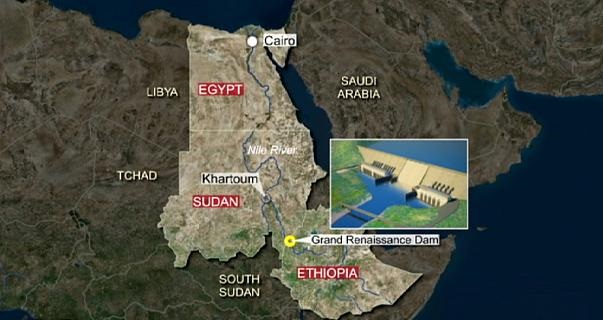Alwaght-An apparent alliance is shaping up with Saudi and Qatari regimes engaging in evidently hostile acts against Egypt which has traditionally led the Arab world.
Relations between Ethiopia and Persian Gulf monarchies have been witnessing improvement in recent months, with Ethiopia receiving a number of Saudi and Qatari officials.
Qatari Foreign Minister Mohamed bin Abdul Rahman arrived in Addis Ababa on Sunday in a first-of-its-kind move after four years of broken relations between the two countries.
In 2015, Qatar launched investments worth $500 million in factories and industrial facilities in Ethiopia. The Qatari FM’s visit to Ethiopia came three days after a visit by an official Saudi delegation headed by Ahmed Al-Khateeb, senior advisor to the Saudi royal court and board chairman of the Saudi Fund for Development (SFD). Al-Khateeb met with Ethiopia's Prime Minister Hailemariam Dessalegn in Addis Ababa.
Qatar, Saudis Back Ethiopian Dam to Deny Egypt Nile Waters
The Ethiopian prime minister called on Saudi Arabia during Khatib's visit to support the Renaissance Dam project and to invest in Ethiopia.
The Qataris-Egyptians relationships is always strained except for the brief periods of the ousted Egyptian President Mohammed Morsi. Efforts by the Saudis to reconcile the differences between Qatar and Egypt failed dismally. Following Egypt’s position on the Syrian crisis and following Egypt’s vote in support of the Russian drafted resolution in October, the Saudi regime joined Qatar’s position against the government of Abdel Fattah el-Sisi of Egypt.
In reaction to Qatari FMs visit to Ethiopia, Hashim Majid, a member of African Affairs Commission in Egypt’s parliament accused Qatar of taking openly antagonistic policies against Egypt. He further blamed Qatar of backing terrorist groups in the north African state. He added that Egypt is getting closer to African countries especially in the Nile basin states to secure Cairo interests.
In pursuit of this policy, Egyptian president Abdel Fattah Al-Sisi visited the East African state of Uganda on Sunday on an official visit which lasted one-day. The visit to the country dubbed the source of river Nile, was abrupt as it came after a Saudi official visited the Ethiopia’s Renaissance Dam, which is currently under construction. Egypt fears that the dam’s construction could affect its historical quotas of Nile waters. The unfolding scenario on Nile water supply to Egypt and its implications on the country’s national security is a potential source of a future bloody conflict involving several countries.
Old Egypt, Saudi Rivalries
Egypt and Saudi Arabia have over the past decades competed to lead the Arab with each of them competing to establish influence in different parts of the Arab world.
Cairo-Riyadh tensions have escalated in recent months with newspapers allied to each side throwing barbs at each other sometimes bordering on outright contempt.
Naïve Saudi diplomatic machinery is intent on using petrodollars to force the kingdom’s control over other Arab states forgetting Egypt’s historical position as the leader of the Arab world.
The Saudis are engaged in efforts to gain the support of countries such as Qatar, Ethiopia and Bahrain in order to pressurize Egypt to toe Riyadh’s line. On the other hand, Egypt is reaching out to major Arab states including Iraq, Syria and Algeria. These countries have historically had cordial ties with Egypt and have common stances in combating Wahhabi extremism and Saudi warmongering policies.
Saudis must Accept Harsh Reality
The Saudis are attempting to replicate in the Arab world US domineering policies the West Asia region and other parts of the world. Many Arab countries with independent policies have rejected Saudi overtures. Saudi strategies have failed miserably in Yemen, Lebanon, Iraq and Syria and this has encouraged Egypt to pursue its independent policies in the region while ignoring Saudi interests.
Tensions between Riyadh and Cairo are set to move to the next level with intense behind the scenes struggles already leaking to the media.
The Saudi regime is unable to exert influence over most regional countries and therefore Riyadh cannot rally other Arab countries against Egypt. The Saudi monarchy has to accept and respect the harsh reality about the power balance in Arab countries



























